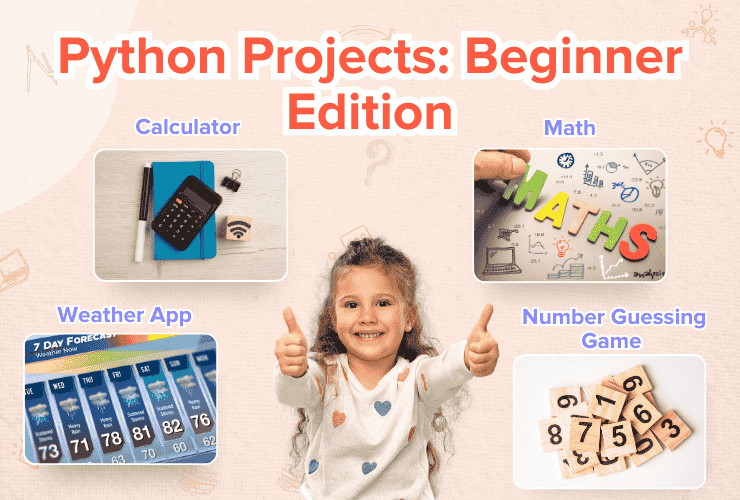Table of Contents
Introduction Top Beginner-Friendly Projects in Python Frequently Asked Questions (FAQs) ConclusionIntroduction
Are you always passionate about creating projects in your life but you are still in the beginner stage? Well, you are on the right path! Python programming is one of the easiest programming languages to start with especially for beginners! It’s not only useful but also really exciting and fun! As a beginner, Python will be quite a hustle for you. But there’s always a easy start for any huge mountain!
Well then, let’s explore some fun Python projects for beginners that will help you learn more about coding.
Top 10 Beginner-Friendly Projects in Python

1. Calculator
Creating a calculator is one of the best projects for beginners. With Python, you can make a simple calculator that adds, subtracts, multiplies, and divides numbers. You’ll use basic math operations and input from users to perform the calculations.
# Simple calculator in Python
def add(x, y):
return x + y
def subtract(x, y):
return x - y
def multiply(x, y):
return x * y
def divide(x, y):
return x / y
# Input from the user
num1 = float(input("Enter first number: "))
num2 = float(input("Enter second number: "))
operation = input("Choose operation (+, -, *, /): ")
if operation == '+':
print(add(num1, num2))
elif operation == '-':
print(subtract(num1, num2))
elif operation == '*':
print(multiply(num1, num2))
elif operation == '/':
print(divide(num1, num2))
else:
print("Invalid input")
2. Number Guessing Game
In this project, you’ll create a game where the computer picks a random number, and the user has to guess what it is. It’s a great way to practice working with loops and conditionals.
import random
number = random.randint(1, 100)
guess = None
while guess != number:
guess = int(input("Guess a number between 1 and 100: "))
if guess < number:
print("Too low!")
3. Mad Libs Game
A fun word game where you can create a silly story by filling in blanks with random words. In Python, you can ask the user for different words (like a noun, verb, or adjective), and then use those words to complete a funny story.
noun = input("Enter a noun: ")
verb = input("Enter a verb: ")
adjective = input("Enter an adjective: ")
print(f"The {adjective} {noun} decided to {verb} all day long!")
4. Rock, Paper, Scissors Game

This classic game is a great beginner project. You’ll let the user choose rock, paper, or scissors and have the computer pick a random choice. Then, you compare the two choices to see who wins!
import random
choices = ["rock", "paper", "scissors"]
computer = random.choice(choices)
player = input("Choose rock, paper, or scissors: ")
if player == computer:
print("It's a tie!")
elif (player == "rock" and computer == "scissors") or (player == "paper" and computer == "rock") or (player == "scissors" and computer == "paper"):
print("You win!")
else:
print("Computer wins!")
5. Simple To-Do List
Something that helps you keep track of everything and pending tasks. You can create a simple to-do list program where users can add, remove, and view tasks. If you’re new to creating lists then this is a cool simple project to work on.
to_do_list = []
while True:
task = input("Enter a task (or 'done' to stop): ")
if task == 'done':
break
else:
to_do_list.append(task)
print("Your tasks are:")
for task in to_do_list:
print(task)
6. Dice Rolling Simulator
In this project, you can simulate the rolling of a dice. Now every time you or any player runs the problem, they will land on a certain number from 1 – 6. It’s a simple project that helps you work with random numbers in Python.
import random
def roll_dice():
return random.randint(1, 6)
print("Rolling the dice...")
print(f"You rolled a {roll_dice()}")
7. Password Generator
A password generator creates random passwords for users. You can set rules for the length and characters (letters, numbers, and symbols) to make strong passwords.
import random
import string
def generate_password(length):
characters = string.ascii_letters + string.digits + string.punctuation
password = ''.join(random.choice(characters) for i in range(length))
return password
length = int(input("Enter the length of the password: "))
print("Your password is:", generate_password(length))
8. Simple Stopwatch
A stopwatch is a fun project that teaches you how to work with time in Python. Just like a normal basic stopwatch, where you can start, or stop time accordingly, you can create the same with basic Python commands.
import time
start_time = time.time()
input("Press Enter to stop the stopwatch...")
end_time = time.time()
elapsed_time = end_time - start_time
print(f"Elapsed time: {elapsed_time} seconds")9. Weather App

With some basic knowledge of APIs (Application Programming Interfaces), you can create a simple weather app. You can use the OpenWeatherMap API to get weather data and display it to the user.
import request
api_key = "your_api_key"
city = input("Enter your city: ")
response = requests.get(f"http://api.openweathermap.org/data/2.5/weather?q={city}&appid={api_key}")
weather_data = response.json()
print(f"Weather in {city}: {weather_data['weather'][0]['description']}")
10. Turtle Graphics
The ‘turtle’ module in Python lets you create fun drawings and patterns. It’s like having a small turtle that moves around the screen, drawing lines as it goes, just like the short snake game we used to play when we were kids! Now you can control your turtle’s movements and create multiple shapes accordingly.
import turtle
my_turtle = turtle.Turtle()
# Draw a square
for _ in range(4):
my_turtle.forward(100)
my_turtle.right(90)
turtle.done()Frequently Asked Questions (FAQs)
1. I’m a complete beginner. Can I really build these Python projects?
Absolutely! These projects are designed for beginners. Each one uses simple Python concepts like loops, functions, and input/output — perfect for learning by doing.
2. Do I need to install any special software to start?
You only need Python installed on your computer (version 3.x recommended). You can also use free online editors like Replit or Google Colab — no installation needed!
3. How long will it take to complete one project?
Most projects can be done in 30 minutes to 2 hours, depending on your pace and interest. You can always revisit them later to improve or add new features!
4. Are these projects suitable for kids or teens?
Yes! These are beginner-friendly and often used in coding camps for kids and teens. They’re fun, interactive, and great for learning coding basics.
5. Can I show these projects on my school portfolio or during competitions?
Definitely. These are perfect for showing your interest in programming. You can also customize them to make them more creative or advanced!
6. I made a mistake in my code. What should I do?
Mistakes are part of learning! Try reading the error message, check your syntax, or look up the issue online. Debugging is a valuable skill every coder learns over time.
7. Where can I learn more after trying these projects?
You can explore more intermediate-level Python tutorials, join a coding club, or sign up for a free trial coding class to learn live with expert guidance.
8. What age is best to start learning Python?
Kids as young as 8 years old can start learning Python with the right guidance and beginner-friendly content. It’s never too early (or late) to start!
9. Do I need to know math to code in Python?
Basic math helps, but you don’t need to be a math genius. Most of these projects focus on logic and creativity more than complex calculations.
10. How can I save and share my projects?
If you’re using an online editor, you can save and share the project link. If coding on your computer, you can save the.py file and email or upload it to share.
Conclusion:
Wasn’t that interesting? Python is not always for advanced users or people with experience. Anyone around the world can learn and create whatever they like with Python. With the above mentioned simple set of Python projects for beginners, you can now find it simple to adapt with the digital world of coding. Python in this way is one of the easiest programming languages in the digital word of coding. Want to learn more about coding? Jump right on to code camps for kids, where your kids learn to adapt to the digital world of coding through simple and fun learning experiences! Let them join their first trial class today!
Encourage learning everywhere you go and have fun with your coding journey! Happy coding!












